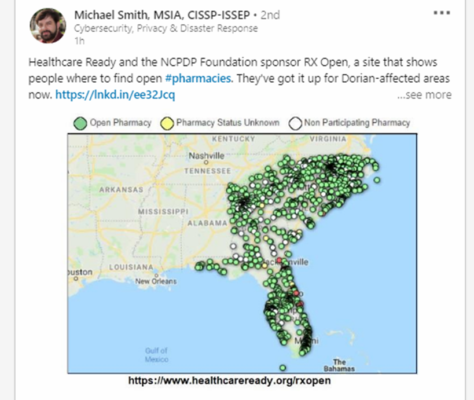Think for a moment. In your household, how many people take prescription medicines?
In all, how many different pills or medicines do you keep track of on a regular basis?

Last week, I told you about Joe’s episode with the allergic reaction. Since then, OUR list of medicines has grown exponentially! New pills with dosages that changes daily. Inhalers. The doctors assure us it’s a temporary thing, but keeping track of them all is tough!
Managing medicines in an emergency will be so much more difficult!
Imagine how you’ll cope when your home is damaged by flood, fire or winds!
- First, you have to find all those medicines. If your home is severely damaged or you had to rush out, it may take a while, or you may not be able to rescue the medicines at all! Do you have an emergency supply packed up so you can grab it and take with you at a moment’s notice?
- Next, to make sure no one is taking the wrong dose after an interruption, you will have to set up a new schedule. (Surely you have seen bottles that say, “Do not stop taking this medicine!” or, “If you miss a dose, follow these important instructions . . .”) Consider people taking insulin. You need to know by heart what the appropriate response to missed insulin would be for YOU based on your condition and the type of insulin you take.
- OK, you have no emergency supply, or you’ve used it up, and the emergency continues. You are searching desperately for a refill, but all the offices and stores where you usually shop have been shut down by the disaster, too. What can you do?
Here are some new resources for managing medicines in an emergency.
Find a pharmacy with RX Open.
When Dorian hit a month ago, a website was activated that showed all the pharmacies that were open for business in every state in the southeast. Here’s the notice I got thanks to a post from Michael Smith that appeared in the LinkedIn CERT group. (Not a real clear image, sorry.)

Rx Open displays the precise location on Google Maps of open pharmacies, closed pharmacies, and those whose status is unknown. The site is maintained and is open to the public at no cost during a disaster through the support of Health Care Ready and the National Council for Prescription Drug Programs, (NCPDP) Foundation.
Of course, pharmacies have to sign up to be listed in the RX Open database. Action item: Next time you head to your pharmacy, ask if they are members.
Get an emergency prescription refill.
Let’s assume you had an emergency supply of prescriptions, and were able to use it. But now you’ve run out. Your doctor is unavailable, and your usual pharmacy is still closed. What are your options for getting an emergency refill?
It turns out that some states have what are called emergency prescription laws. They vary, of course. But they all seem to require that first, an emergency be declared. Then, if a pharmacist can’t reach the usual doctor for authorization, a prescription may be refilled “if failure to refill might interrupt the patient’s ongoing care and have a significant adverse effect on the patient’s well-being.” (These quotes are from a statement issued in 2017 by the CA State Board of Pharmacy.)
This last paragraph applies to California, which seems to allow “a reasonable amount of the medicine.” Some states limit emergency refills to a 72-hour supply. Some states have NO emergency refill laws.
Action Item: Find out about YOUR state’s requirements regarding managing emergency prescription refills! Here are two places to start your research:
- https://www.healthcareready.org/blog/state-emergency-refills
- https://blogs.cdc.gov/publichealthmatters/2019/09/prescription-preparedness/
Store prescriptions safely at home.
A couple of reminders before we move on. I hope you’re familiar with these.
If you have specific medical conditions or allergies, consider wearing a medical ID bracelet. Essential in an emergency situation.
If you get regular medical treatments (for example, dialysis) find out what the emergency procedures are at your clinic and get a list of back-up service providers in case you need to get treatment in an emergency. Keep that list in your important papers.
Now, we’ve said it so many times. The most LIKELY emergency you’ll encounter will be a power outage. That means no refrigeration.
Your problem: medicines that need to be refrigerated!
Here are some suggestions that we put into the new Disaster Survival Guide series Workbooks. Will any of these work for you? Build your own Action Item list.
- Find out the safe temperature range for your medicines. (Some may not really need refrigeration.)
- In an emergency, could a different formula of your medicine work, one that doesn’t need refrigeration? Check with your doctor on this!
- If an outage is announced, be ready with an insulated cooler that you can promptly fill with ice to protect medicines for at least a few days.
- Consider purchasing a solar-powered refrigerator/freezer and know how to use it in an emergency.
Below is an example of a solar-powered portable refrigerator so you can get an idea of size, capabilities, and cost. What to consider as you shop:
- Capacity – Measured in quarts. How much space do your really need for your medicines?
- Weight – While most portable refrigerators have wheels so they can be rolled, they are heavy to lift.
- Temperature achieved – A number of the “camping” or “portable” refrigerators get down to -4 degrees, which is below freezing. The lower the temperature you require, the more expensive the refrigerator you’ll need. “Cool” or “freezing” is the question.
- Battery power – Some portable refrigerators have no battery. They simply plug either into the wall or into the car battery for power. If you want solar, you’ll need a DC connection for solar AND a battery to store the power when the sun isn’t shining. (You’ll probably get an AC connection, too.)
- Solar panels – The chest itself does not provide sufficient solar panel expanse (if it has any at all) to provide the cooling power. You will need to purchase companion panels (maybe 80 – 120 watt) at additional cost.
Click on the image or the link below to go to Amazon, where we are associates. This particular model of portable refrigerator/freezer has a lot more information below all the sales and comparison information, so scroll down to read it. There are pictures of a complete set-up (with panels and storage battery) and also a couple of homemade videos that I found very useful.

Thanks for reading, and taking action.
Virginia
Your Emergency Plan Guide team
P.S. If I had a need for emergency refrigeration, I would probably keep the portable refrigerator pre-cooled all the time, using its electric hookup. Then in the emergency, use the solar to keep the frig “topped off.”
Don't miss a single Advisory.
Thank you for subscribing.
Something went wrong.
